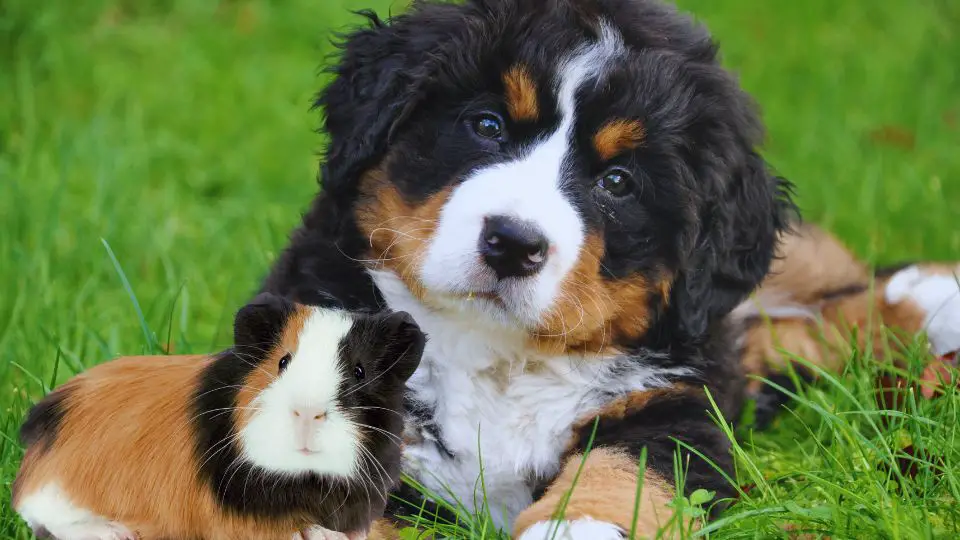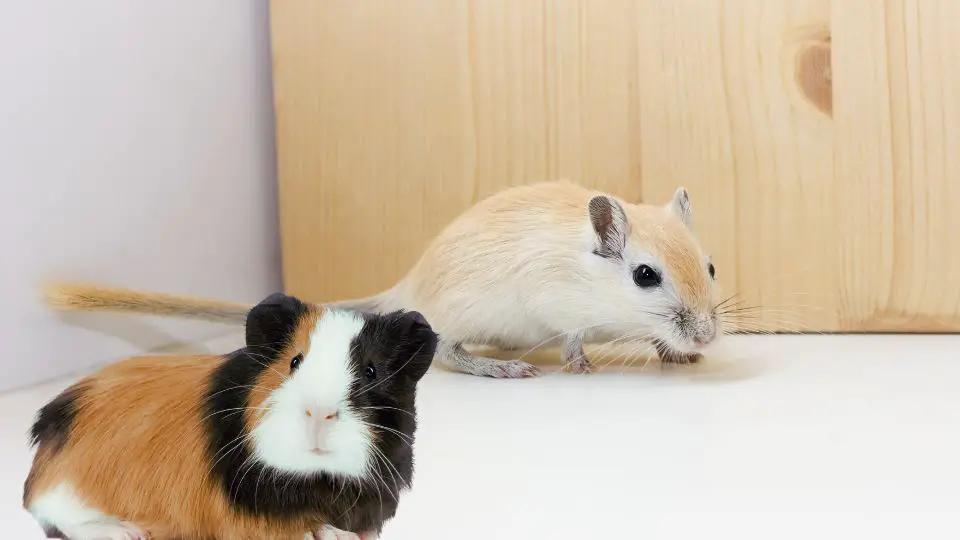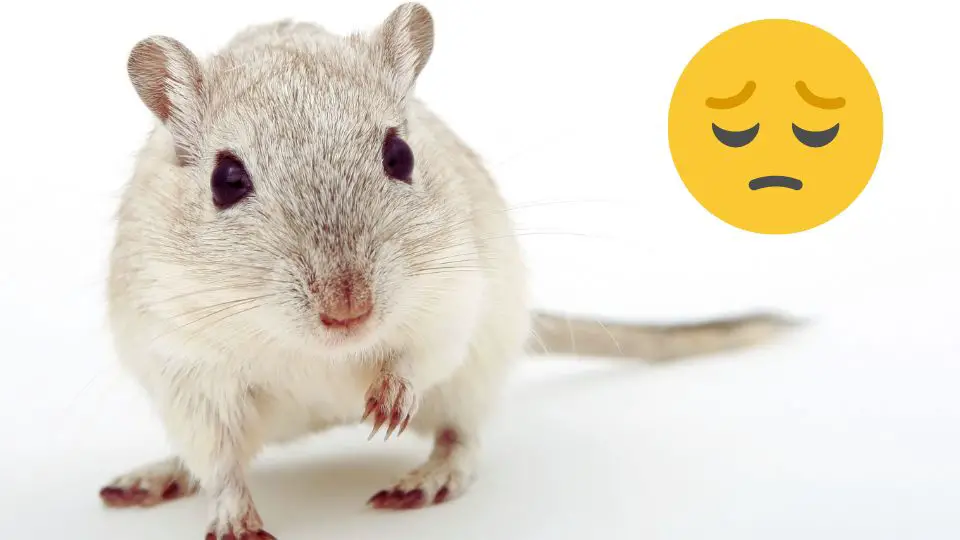Now that you’ve finally decided to get a gerbil, it’s time to give your furry friend the perfect home! A gerbil cage is a necessity, but there’s more to consider than just that.
In this article, we’ll give you all the tips and tricks for finding a cage, a step-by-step guide to how to set up a gerbil cage, and creating a cozy environment that your gerbil will love. Let’s dive in!
Cage Requirements
Gerbils are active animals that need plenty of space to run, jump, and play. Keeping a gerbil into a cage that is too small can cause stress and health problems for your gerbil.
The minimum recommended size for a gerbil cage is 24 inches (ca. 61 cm) long, 12 inches (ca. 30 cm) wide, 12 inches tall. This will give your gerbil enough room to move around comfortably and provide them with plenty of space to play and explore.
There are three main types of cages for gerbils: metal, acrylic, and wooden. Each type of cage has its own set of pros and cons.
- Metal cages are durable and easy to clean, but they can be expensive and can get quite cold in the winter.
- Acrylic cages are lightweight and easy to clean, but they can be expensive and can scratch easily.
- Wooden cages are affordable and provide a natural environment for your gerbil, but they can be difficult to clean and can harbor bacteria and parasites.
- Plastic cages are also an option, but they can be difficult to clean, and the plastic can contain chemicals that can be harmful to your gerbil. We don’t recommend using them.
When it comes to bar spacing and thickness, it’s important to choose a cage that has the proper spacing and thickness for your gerbil. Gerbils are small animals, and they can easily slip through bars that are too wide or too thin.
The recommended bar spacing for a gerbil cage is no more than 1/2 inch, and the recommended bar thickness is no less than 1/8 inch.
Glass Aquariums or Terrariums
Glass aquariums and terrariums are not recommended for gerbils. The air circulation in these enclosures is limited, making it difficult to maintain an appropriate temperature and humidity level for your gerbil. Additionally, the smooth glass walls prevent your gerbil from getting the exercise they need.
If you want to use an aquarium or terrarium for your gerbil, you have to make sure you add a mesh or wire top to the enclosure. This will allow for better air circulation and provide your gerbil with vertical surfaces they can climb on.
Bedding and Lining
When it comes to setting up the perfect home for your furry little friend, one of the most important things to consider is bedding and lining. Not only does it make their cage look cozy and inviting, but it’s also crucial for their health and well-being.
Don’t forget to change the bedding in your gerbil’s cage at least once a week, or more frequently if the cage becomes soiled. This helps to keep the cage clean, fresh and prevent odors.
The most common types of bedding are paper-based bedding, aspen bedding, and recycled paper bedding. Each type has its own set of pros and cons.
Paper-based bedding
Paper-based bedding is the most common type of bedding used for gerbils. It’s inexpensive, absorbent, and easy to find. However, it can be dusty and may not be as environmentally friendly as other options.
Aspen bedding
Aspen bedding is made from the wood of the aspen tree and is a great alternative to paper-based bedding. It’s soft, absorbent, and not as dusty as paper-based bedding. However, it can be more expensive than other options.
Recycled paper bedding
Recycled paper bedding is made from recycled paper and is a great eco-friendly option. It’s soft, absorbent, and not as dusty as paper-based bedding. However, it can be more expensive than other options.
Remember that, if you find that your gerbil is scratching the cage walls, you may need to give them more bedding or a different type of bedding.
Accessories
Are you ready to take your gerbil’s cage to the next level? We’re talking about accessories, baby! Not only do they make the cage look great, but they also provide important enrichment for your gerbil.
Every gerbil cage needs a food dish and a water bottle. These are a no-brainer. But let’s add some flair, shall we? Hideaways are a must-have for any gerbil cage. These little hidey-holes provide a cozy spot for your gerbil to nap and relax. Plus, they’re like a little gerbil fort, and who doesn’t love a good fort?
Now, let’s talk toys. Gerbils are active little pets, and they need toys to keep them entertained. Some popular options include exercise wheels, tunnels, and chew toys. But, let’s get creative! How about a little gerbil playground? You can make your own with cardboard boxes and tubing. Or, you can buy pre-made gerbil playsets.
Here is a short list of “must-have” accessories for your gerbils cage:
- Food dish: A sturdy dish for holding your gerbil’s food.
- Water bottle: A bottle with a sipper tube that attaches to the side of the cage.
- Hideaway: A small, cozy structure for your gerbil to nap and relax in.
- Exercise wheel: A wheel that your gerbil can run on to stay active and healthy.
- Tunnels: Plastic or cardboard tubes that your gerbil can run through.
- Chew toys: Safe toys for your gerbil to gnaw on, such as wooden blocks or mineral chews.
- Platforms and Ladders: a raised platform or a ladder for your gerbil to climb and explore.
- Hammocks and Baskets: a soft and cozy hammock for your gerbil to rest in, or a basket for them to play in.
- Cardboard castle or other interactive toys: to provide a fun and stimulating environment for your gerbil to explore.
Note that gerbils love to chew, so make sure that any toys or accessories you provide are safe for them to gnaw on. We always recommend to rotate the toys and accessories in the cage to keep things interesting for your pet.
Placement
So, you’ve got your gerbil cage all set up and ready to go, but have you thought about where to put it? The placement of the cage can have a big impact on your gerbil’s health and happiness.
First and foremost, it’s important to avoid placing the cage in areas with drafts or direct sunlight. Gerbils are sensitive to temperature changes, and a drafty or excessively sunny spot can make them uncomfortable. A room with a moderate temperature and minimal direct sunlight is the ideal location.
Another thing to consider when placing your gerbil’s cage is the noise level in the room. Gerbils are sensitive to loud noises and can become stressed if they’re kept in a room with a lot of activity or noise. A quiet room or a room where the noise level is consistent is the best choice.
Additionally, you can add some plants to your gerbil’s cage to make it more natural.
Cleaning and Maintenance
Keeping your gerbil’s cage clean and well-maintained is crucial for their health and happiness. Gerbils are clean animals and they require a clean living environment. A dirty cage can lead to health problems such as respiratory infections, and can also make your gerbil stressed.
So, how often should you clean the cage? We recommend cleaning the cage once a week, or more frequently if the cage becomes soiled. This helps to keep the cage fresh and odor-free.
When it comes to cleaning the cage, you’ll want to focus on several key areas. First, remove any uneaten food and feces from the cage. Next, clean the water bottle and food dish. Then, spot clean the cage as necessary, paying special attention to areas that have been soiled. Finally, replace the bedding and lining with fresh material.
Remember to always use safe cleaning products, such as pet-safe disinfectants or vinegar and water solution. Avoid using strong chemical cleaners, as the fumes can be harmful to your gerbil.
Regular cage inspections are also important to ensure that everything is in good working order, that the cage is clean and to check for any potential hazards. Check for any loose wires, parts or anything that could be a potential danger for your gerbil.
Step-by-step guide to setting up a gerbil cage
Here’s a step-by-step guide to setting up a gerbil cage:
- Choose a suitable cage: The cage should be at least 24 inches long, 12 inches wide, and 12 inches tall, and have a solid bottom. Avoid cages with wire floors, as they can be harmful to gerbils’ feet.
- Add bedding: Line the bottom of the cage with at least 2 inches of bedding, such as paper-based bedding, aspen shavings, or recycled paper bedding. Avoid cedar or pine shavings as they can be harmful to gerbils.
- Add a hideaway: Gerbils need a place to hide and feel secure, so add a hideaway or a small house to the cage. A small plastic igloo or a cardboard tube works well.
- Add a food dish: Make sure the food dish is heavy enough so it won’t tip over, and place it in an area of the cage that is easy for the gerbil to access.
- Add a water bottle: Make sure the water bottle is securely fastened to the side of the cage and placed in an area that is easy for the gerbil to access.
- Add toys and climbing structures: Gerbils need things to play with and explore. Offer them things like wheels, tubes, and blocks to keep them active.
- Place the cage in a suitable location: Gerbils need to be kept in a quiet place with a stable temperature, away from drafts and direct sunlight.
- Introduce your gerbil: Once the cage is set up, introduce your gerbil to the new environment and give them time to explore and get used to it.
- Regularly check and maintain the cage: Check the cage and its contents daily, and clean it thoroughly at least once a week. Make sure that the bedding is clean and dry, the food and water are fresh, and the toys are in good condition.
Conclusion
Gerbils are playful, curious and social animals that make great pets. By providing the appropriate items for your gerbil’s cage, as well as a safe and comfortable environment, you can ensure that your gerbil is happy and healthy.
Remember to keep their cage clean and inspected regularly to help them stay safe and content. With the right care and attention, your gerbil can be a lifelong companion!







